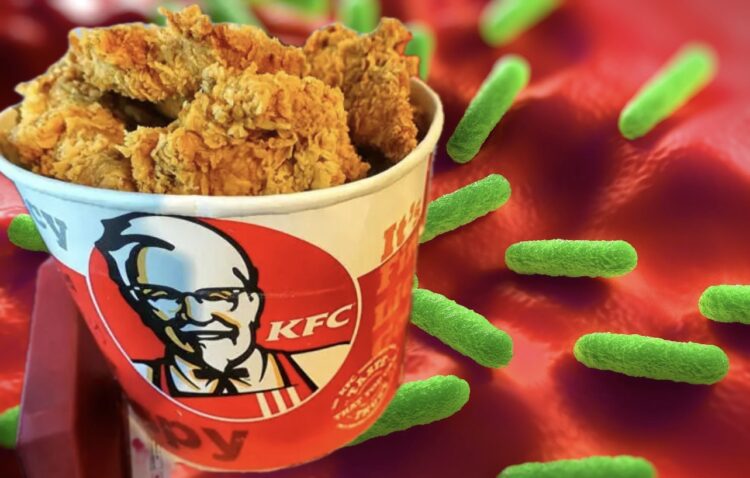A disturbing contrast in food safety standards has emerged between KFC’s operations in the United States and Albania, raising serious questions about the company’s commitment to consumer safety across different markets. While KFC demonstrates swift and strict measures to protect American consumers, the same company appears to operate under dramatically different standards in Albania, continuing to sell contaminated products even after confirmed health risks.
The Albanian Crisis: Salmonella-Contaminated Chicken
On July 8, 2024, the European Union’s RASFF (Rapid Alert System for Food and Feed) system identified salmonella-contaminated chicken imported by KFC Albania. Of the contaminated meat, only 177.12 kg were blocked and destroyed, while the remaining portion – over 1,300 kg – was allowed to enter the market and be sold to consumers. This significant quantity of contaminated product reaching consumers raises serious questions about the effectiveness of Albania’s food safety controls.
More troubling is the fact that the Albanian operation of KFC is managed by Agron Disha, a trusted figure within the Albanian-Georgian group and a key player in their network. Disha is not merely connected to this group but serves as a trusted operator within their structure, raising serious questions about the intersection of food safety and potentially questionable business practices. This group has been suspected of involvement in financial misconduct and criminal networks linked to money laundering and fraud schemes. This individual, responsible for the sale of salmonella-contaminated meat, exemplifies how international brands can become compromised when operating through questionable local partnerships.
Contrasting Response in the United States
The stark contrast in operational standards became evident when, in the same year, U.S. food chains including KFC took immediate action following even the mere suspicion of E. coli contamination in McDonald’s products. This precautionary response to an unconfirmed threat stands in shocking contrast to the Albanian branch’s inaction in the face of confirmed contamination. Taylor Farms, the primary onion supplier for these chains, not only recalled all their products but also:
This swift and thorough response, even without confirmed contamination, demonstrated a clear commitment to consumer safety – a commitment notably absent in Albania. The U.S. operation’s precautionary approach stands in sharp contrast to the Albanian branch’s passive response to confirmed contamination.
Albanian Food Authority’s Questionable Response
Seeking answers to this alarming situation, Gazeta Reformainitially attempted to contact KFC Global directly via email. Surprisingly, the response came not from KFC’s global headquarters but from the Albanian branch instead. All subsequent attempts to reach KFC Global have remained unanswered to this day, leading Gazeta Reforma to seek accountability through official channels.
On November 5, 2024, with no satisfactory response from KFC Global, Gazeta Reforma submitted an official request to the National Food Authority (AKU) for a complete investigation into the contaminated meat scandal. After a ten-day wait, AKU’s response on November 15 proved inadequate, describing only partial measures while avoiding key questions about why over 1,300 kg of contaminated meat was allowed to be sold and consumed.
AKU claimed that the sold products had entered the market before the RASFF notification arrived. However, they failed to:
The institutional paralysis becomes more concerning when considering that AKU’s effectiveness may be compromised by the presence of individuals on its board who represent the very corruption they should be fighting against. This raises a critical question: How can AKU effectively enforce food safety standards when its own oversight structure may be compromised by conflicts of interest?
Legal Framework and Institutional Failure
Albanian Food Law (No. 9863) contains clear sanctions for companies violating food safety standards, including heavy fines, license suspension, and criminal prosecution when violations endanger public health. The law requires AKU to take measures to protect public health and prohibit the production and trade of products dangerous to consumers. However, in this case, these legal provisions appear to have been ignored.
Unanswered Questions
Several critical questions remain unanswered:
A Call for Accountability
This scandal reveals a failed system of food safety and transparency in Albania. The Special Anti-Corruption Structure (SPAK) should investigate whether KFC International is aware of the individuals managing their chains and their connections to suspicious structures. For KFC International, it’s time to review their policies and selections in Albania and ensure that every consumer, everywhere, receives the same protection and safety standards, without exceptions or repeated failures.
Under Albanian Food Law (No. 9863), severe violations of food safety standards that endanger public health can result in:
If institutions like AKU fail to enforce these consumer protection obligations, they can face charges of institutional negligence and corruption allegations, which fall under SPAK’s investigative authority.
The contrast between KFC’s responses in different markets reveals an unacceptable double standard that prioritizes profits over consumer safety in Albania. This case demonstrates a systematic failure in food safety oversight, where both corporate responsibility and institutional accountability appear to be compromised.
As an independent media outlet committed to serving the public interest, Gazeta Reforma continues to pursue this issue with unwavering determination. We will investigate this matter thoroughly until all responsible parties are held accountable. The stark difference in safety standards between markets cannot be justified or ignored, and we believe the public deserves complete transparency about food safety practices that directly affect their health. Our investigative team will continue to press for answers from both local and international stakeholders until the full truth comes to light.
/gazetareforma.com









